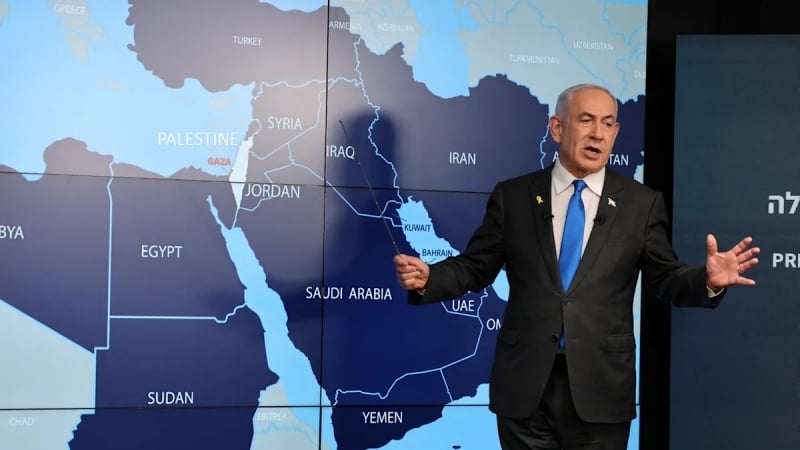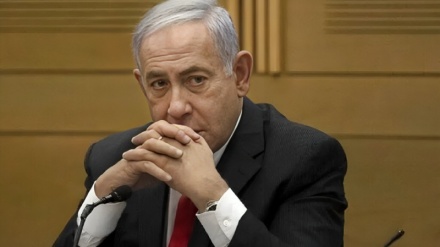Islamic countries unite against the “Greater Israel” plan; A move to counter expansionism of the Zionist regime
-

Benjamin Netanyahu
Pars Today – In an unprecedented reaction, 31 Islamic countries issued a joint statement condemning Benjamin Netanyahu’s plan to establish the so-called “Greater Israel.” They warned of the dangerous consequences of this expansionist policy, describing it as a threat to regional security, a clear violation of international law, and a step that would escalate violence and instability in West Asia.
The foreign ministers of 31 Arab and Islamic countries, along with regional organizations, strongly condemned statements by Benjamin Netanyahu, prime minister of the Zionist regime, regarding a “Greater Israel,” describing them as a direct threat to Arab national security and regional peace. The statement emphasized that these remarks constitute a blatant violation of international law and the principles of international relations.
Recalling UN Security Council Resolution 2334 and the advisory opinion of the International Court of Justice, these countries warned that the policies and actions of the Zionist regime—including the continuation of the occupation of Palestinian territories, the expansion of settlements in the West Bank and East al-Quds, and attacks on Islamic and Christian holy sites such as Al-Aqsa Mosque—would exacerbate the crisis in the region.
The foreign ministers of the Arab and Islamic countries and regional organizations condemned the crimes of the Zionist regime, including acts of genocide, ethnic cleansing, and the blockade of Gaza, and called for an immediate ceasefire and unconditional access for the people of Gaza to humanitarian aid.
The statement, also backed by the Arab League, the Organization of Islamic Cooperation (OIC), and the Persian Gulf Cooperation Council (PGCC), reflects a broad consensus against the expansionist policies of the Zionist regime. In the statement, the “Greater Israel” plan is described as a direct threat to the national security of Arab and Islamic countries, as well as to regional and global peace.
The Islamic countries emphasized in their statement that Netanyahu’s remarks regarding “Greater Israel” constitute a clear violation of international law and the UN Charter. They declared their commitment to institutionalizing peace and confronting expansionist delusions and acts of coercion, stressing that this plan is not only a threat to Palestine but also a serious danger to the entire West Asia region and even to the international order.
The “Greater Israel” plan, promoted by certain Zionist circles—particularly Benjamin Netanyahu—also constitutes a serious threat to the security of the West Asia region. Beyond its political and military dimensions, the plan carries extensive geopolitical, humanitarian, and cultural consequences. According to this plan, the Zionist occupiers’ claims of ownership extend over the territories of several Islamic countries, far beyond occupied Palestine.
The aim of this plan is to expand the borders of the Occupied Territories beyond their current limits, making it one of the most dangerous threats to regional security. These claims imply encroachment on the borders of sovereign countries such as Jordan, Egypt, Syria, and Lebanon, which constitutes a clear violation of international law. Based on extremist Zionist ideas, the plan would lay the groundwork for intensifying conflicts in the region.
The “Greater Israel” plan is accompanied by policies such as the expansion of settlements and the annexation of Palestinian lands, leading to further displacement of Palestinians. These actions constitute violations of human rights and pose a threat to the social and humanitarian stability of the region. Many Arab and Islamic countries have considered this plan a threat to their national security and to the security of the entire region.
Rather than being a practical operational plan, this initiative serves as a political tool for Netanyahu’s survival amid domestic crises. Nevertheless, these statements and maps carry real and dangerous consequences for regional security, peace, and stability. Countering this plan requires regional unity, strengthened multilateral diplomacy, and practical support for the rights of the Palestinian people.
The “Greater Israel” plan is often pursued with the support of foreign powers whose aim is to fragment regional countries and weaken independent states. Regional unity can prevent the implementation of such crisis-inducing projects and help preserve the national cohesion of countries. Regional cooperation can also pave the way for the formation of independent political, economic, and security blocs to counter the ambitions of the Zionist-American axis.


